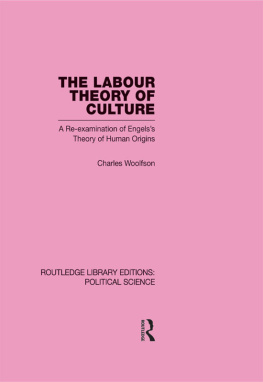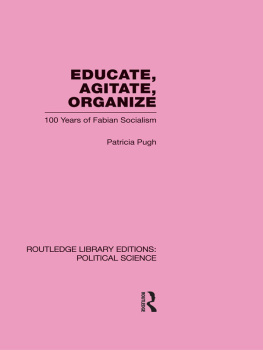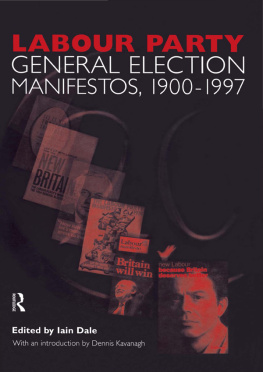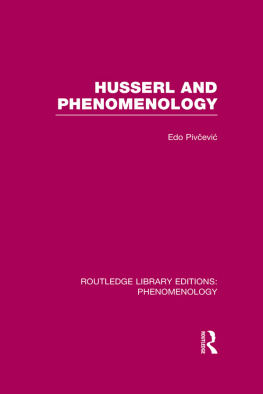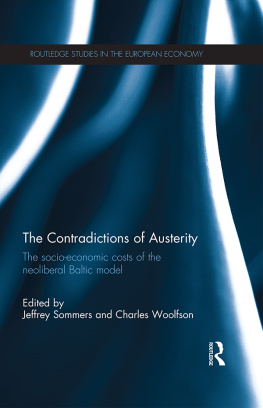ROUTLEDGE LIBRARY EDITIONS: POLITICAL SCIENCE
THE LABOUR THEORY OF CULTURE
THE LABOUR THEORY OF CULTURE
A Re-examination of Engelss Theory of Human Origins
By
CHARLES WOOLFSON
Volume 42
First published 1982
This edition first published in 2010
by Routledge
2 Park Square, Milton Park, Abingdon, Oxon, OX14 4RN
Simultaneously published in the USA and Canada
by Routledge
270 Madison Avenue, New York, NY 10016
Routledge is an imprint of the Taylor & Francis Group, an informa business
1982 Charles Woolfson
All rights reserved. No part of this book may be reprinted or reproduced or utilised in any form or by any electronic, mechanical, or other means, now known or hereafter invented, including photocopying and recording, or in any information storage or retrieval system, without permission in writing from the publishers.
British Library Cataloguing in Publication Data
A catalogue record for this book is available from the British Library
ISBN 10: 0-415-49111-8 (Set)
ISBN 13: 978-0-415-49111-2 (Set)
ISBN 10: 0-415-55583-3 (Volume 42)
ISBN 13: 978-0-415-55583-8 (Volume 42)
Publishers Note
The publisher has gone to great lengths to ensure the quality of this reprint but points out that some imperfections in the original copies may be apparent.
Disclaimer
The publisher has made every effort to trace copyright holders and would welcome correspondence from those they have been unable to trace.
The Labour Theory of Culture
a re-examination of Engelss theory of human origins
Charles Woolfson
Department of Social and Economic Research University of Glasgow
First published in 1982
by Routledge & Kegan Paul Ltd
39 Store Street, London WC1E 7DD,
9 Park Street, Boston, Mass. 02108, USA and
Broadway House, Newtown Road,
Henley-on-Thames, Oxon RG9 1EN
Photoset in 10/12 point Baskerville by
Saildean Limited, Surrey
Charles Woolfson, 1982
No part of this book may be reproduced in
any form without permission from the
publisher, except for the quotation of brief
passages in criticism
Library of Congress Cataloging in Publication Data
Woolfson, Charles, 1946-
The labour theory of culture.
Bibliography: p.
Includes index.
1. Communism and anthropology. 2. Human evolution. 3. Labor and laboring classes - History. 4. Engels, Friedrich, 1820-1895 - Anthropology. I. Title.
HX550.A56W6630681-19960
ISBN 0-7100-0997-6AACR2
For John Foster and William Coyle
Acknowledgments
The following people provided helpful comments and suggestions: David Hamilton, Bridget Fowler, Barbara Littlewood, John Hoffman, Jeffrey Weeks, Henry Mins and Bruce Trigger. Kathleen Clark typed and retyped more times than she probably cares to remember.
Despite the inevitable selectivity in this brief text, the writer sincerely hopes that he has not misrepresented the views of those whose work has been cited.
Introduction
What is surprising, given the concern of Marxist theory with the issue of human development, is the almost total neglect by Western Marxists of recent advances in archaeology, palaeontology, linguistics and such related fields as primatology and anthropology, all of which have raised new and important questions concerning the very origins and nature of the human species. Yet Engelss essay raises an issue central to the whole premises of Marxist theory, namely the formative role of labour in human development and the genesis of human culture.
Nowadays the work of Engels, when not simply ignored, is otherwise subjected to vigorous attack. A work that spans the whole period of human evolution is entirely beyond the competence of this writer. Indeed, following Engels, only the very first conjectural stage (although perhaps most crucial transitional phase, in as much as all subsequent development was shaped by it) is sketched here. Yet if the role of conjecture still remains embarrassingly large, how much more so this was for Engels.
Much of Engelss essay appears to be simply speculative. The evidence available at the time comprised little more than a few fragments of jaw-bone. In the last quarter of the nineteenth century it was still possible to discern only the most blurred outlines of our prehistoric progenitors. In the last quarter of the twentieth century the role of speculation in some ways looms even larger, although certain issues which were unresolved through sheer lack of evidence have been clarified. It is now not so much the results by themselves of this or that piece of research which are important, but their interpretation. Very often it is the interpretation of existing results which shapes the whole direction which future research will take. What Engels achieved over a century ago was to suggest an entirely new emphasis in the study of human evolution based upon a close study of the existing theories which were reinterpreted within the perspective of dialectical materialism that Marx and Engels both shared as the fruits of their joint labour over many years.
Darwin, like many of the writers whose work is examined below, was more anxious to stress the continuities between anthropoids and man. Engels, on the other hand, considered also the qualitative discontinuities introduced by the emergence of social labour, what it was that was special about the development of human beings as a species. While it is true that certain details of his work have been refuted, had Engels been alive today he would undoubtedly have greeted the latest scientific data with alacrity. It is the intention of this book to show that the broad outlines of Engelss theory are, by and large, confirmed by contemporary research, and that in this respect Engelss essay is a brilliant scientific anticipation of what is now thought, by some writers at least, to be the likely pattern of early human evolution. It will be suggested, moreover, that if we are to succeed in providing the kind of interpretation of these researches which will enable their broader significance to be grasped, it is necessary to reappropriate Engelss theoretical legacy in the kind of dialectical reconstruction of recent discoveries that Engels himself proposed.
First of all, therefore, in , fairly early on in human development, perhaps much earlier than many may have imagined hitherto, members of our species had begun to plan and organise their lives precisely because they had developed some form of spoken language in the labour process. Language also provides initial access to the dimension of time and, therefore, it is suggested, the historical passing on of a cultural inheritance of acquired skills and knowledge won through labour becomes possible. The final chapter takes forward the question of the interconnection of tool-making and language, and examines, within the framework of a Marxist psychology, the crucial connection between hand and brain which is forged through labour and opens up to human beings alone the possibility of mastering both themselves and their world.
1 Engels and human origins

